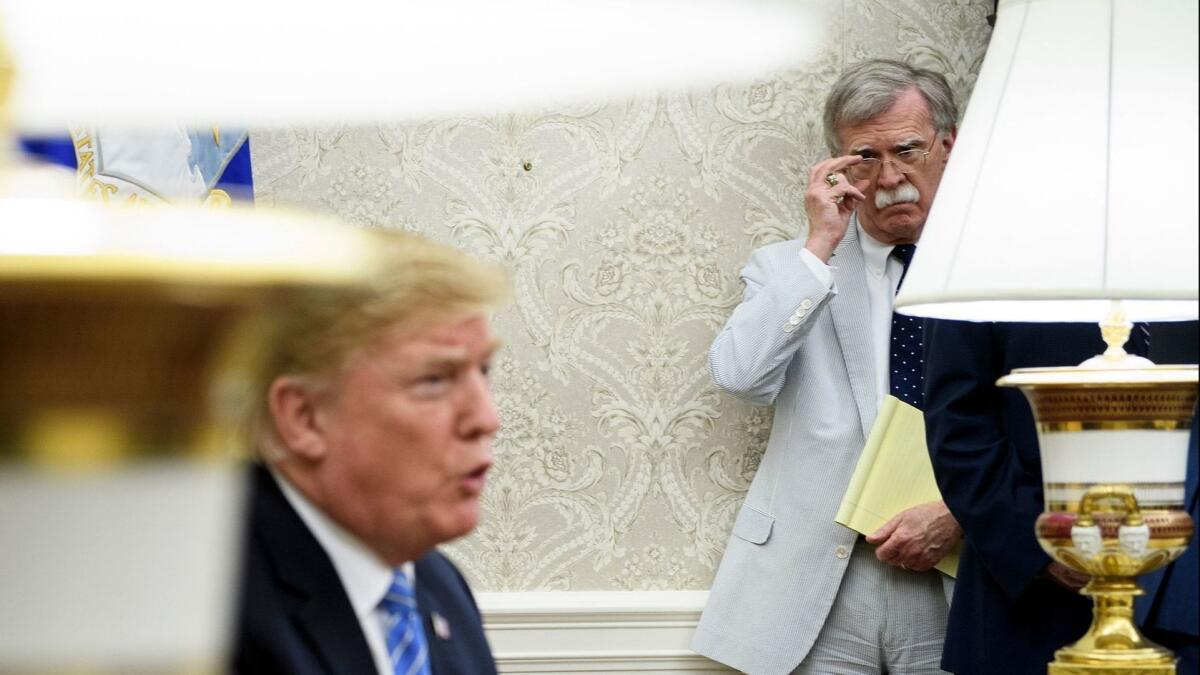Pence, Bolton, Kelly confronted Trump in Oval Office about Russia comments

- Share via
Reporting from BRIDGEWATER, N.J. — Facing condemnation from allies and foes alike on Capitol Hill, President Trump was outnumbered even in the Oval Office. Top aides gathered to persuade the president to issue a rare walk-back of the comments he’d made raising doubts about U.S. intelligence conclusions of Russian election interference as he stood alongside Vladimir Putin.
Vice President Mike Pence, national security advisor John Bolton and Chief of Staff John F. Kelly stood united in the West Wing on Tuesday in their contention that Trump had some cleanup to do. They brought with them words of alarm from Defense Secretary James N. Mattis and Secretary of State Michael R. Pompeo, as well as from a host of congressional leaders and supporters of the president for whom Trump’s public praise of Putin proved to be a bridge too far.
Even for Trump, a leader who has increasingly come to cast off the constraints and guidance of aides, the him-against-the-world position proved untenable. Trump may like doing things his way, eschewing advice and precedent like no president before, but he never likes being alone.
Walking off stage with Putin after their joint news conference in Helsinki, Trump was riding high after his second summit with an adversarial leader in as many months. The highly choreographed affairs had been sought out by the U.S. leader as a way to boost his credibility abroad and his favorability at home, and he believed the latest one had accomplished the task.
But as Air Force One took off into Finland’s endless sunlight on Monday night, Trump’s mood darkened.
The president began dialing around to allies and aides and started to stew about negative media coverage, even from usually friendly Fox News, according to five outside allies and Republicans close to the White House not authorized to speak publicly about private conversations.
The reviews he received were muted — Trump rarely takes kindly to direct confrontation — but it was a taste of what awaited him on his return in Washington, where stalwart allies like Senate Majority Leader Mitch McConnell (R-Ky.) and former House Speaker Newt Gingrich were speaking out.
By the time he arrived home, the parade of critical statements had become a stampede, leaving Trump the most isolated he’d been in the White House since last year’s controversy over white supremacist protesters in Charlottesville. Some in the president’s circle saw parallels in the response to that incident, when the president walked back his August comments critical of “both sides” for protests in the Virginia city, only to later revert to his initial position — that both white supremacists and their detractors shared blame for the violence.
Trump waited 27 hours, sent five tweets and sat for two television interviews after his initial comments in Helsinki before declaring he’d used a confusing “double negative” and mistakenly said “would” instead of “wouldn’t” in a key sentence at his news conference about who was responsible for election meddling.
“The sentence should have been: I don’t see any reason why I wouldn’t — or why it wouldn’t be Russia,” the president said Tuesday before a meeting with Republican members of Congress.
The next day brought a fresh challenge. Trump appeared to answer “no” to a reporter’s question asking whether Russia was still targeting the U.S. Hours later, White House Press Secretary Sarah Huckabee Sanders emerged to say Trump had merely tried to put a stop to the questioning by saying “no,” although he continued discussing Russia after that.
As each White House effort to clean up the situation failed to stem the growing bipartisan backlash, Trump’s mood worsened, according to confidants. He groused about his staff for not better managing the fallout. He was angry at the two American reporters, including one from the Associated Press, who asked questions at the Helsinki news conference. And he seethed at the lack of support he believed he received from congressional Republicans.
More to Read
Sign up for Essential California
The most important California stories and recommendations in your inbox every morning.
You may occasionally receive promotional content from the Los Angeles Times.










